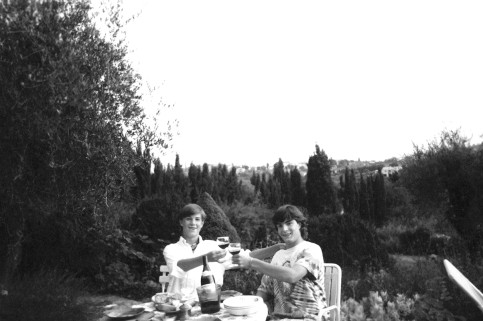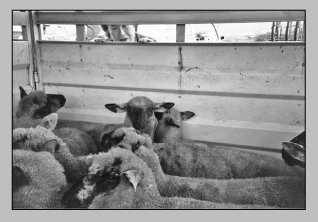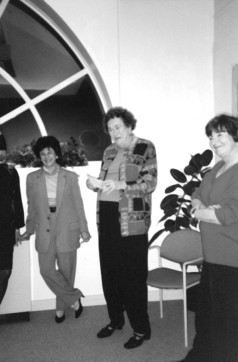Backstage with Julia (29 page)
Read Backstage with Julia Online
Authors: Nancy Verde Barr

As was the case in Providence when I met Julia, the demonstration counter was at least four inches higher than normal height, and I immediately thought of how fatiguing it is to whisk with one's arms raised, so I cradled the bowl low against my stomach.
"I think you'd better put it on the counter so everyone can see," Julia said. I could tell by the devilish look in her eyes that she was creating a skit and I was the straight man, so I went with it and made an exaggerated gesture of lifting the bowl onto the counter. The audience snickered.
"Want a box to stand on?" she said, and the audience roared.
I declined and readied myself for the workout.
"On three," she said, taking hold of the machine's on-off handle. We began, and I whisked with all my might. Julia made a show of casually looking in her bowl and then over into mine. I was far behind. She leaned her arm on her machine, rested her chin in her palm, and pretended to be daydreaming. I sweated. "I think mine are ready," she said, turning off the machine and holding up the beaters to show the peaked egg whites. "How are you doing?"
"Not quite there," I said, changing arms.
"Maybe you should have taken the box."
Demonstrations, signings, concertsâthey were all Julia as usual, but with an added twist. "I am under attack" is how Julia described the not so usual. "I suddenly have to defend myself, and everything I have done and worked for." She was referring to the frequent assaults on her use of butter and creamâor, as she defined it, "nutrition rearing its ugly head." Julia aggressively defended her way of cooking because she believed adamantly that a fear of food would be the death of gastronomy. Moderation, she insisted, was the key, and looking back now, from a time when food scientists tell us "the other spread" is more harmful than butter and invalidate so many erstwhile culinary taboos, Julia's approach makes more sense than ever.
If having to defend herself was new to Julia, then the incident in the elevator was revolutionary. In November, the publishing company Alfred A. Knopf threw a party for its authors. It was a grand affair held, appropriately, at the New York Public Library. My Knopf book,
We Called It Macaroni,
was about to be released, and that qualified me for an invitation, but with a guest list that included the likes of John Updike and Toni Morrison, not to mention Julia with her multiple Knopf publications, I admit that I felt like a poser. That feeling was accentuated by the realization that Julia and I were going to share a car to the event with Anne Rice, whose vampire books were swarming bookstore windows all over the city.
"I'll no doubt be the least recognized person at the party," I told Julia.
"Doesn't matter. Just go up to people and tell them who you are."
Sound advice, and typical Julia, but not part of my DNA. I clutched my invitation, mustered a feeble sense of entitlement to it, and stepped into the ornately mirrored elevator of the posh Park Avenue hotel where we were staying. Two floors down, the doors opened and an elegantly dressed woman got in. She took one look at Julia, pointed an impressively bejeweled finger at her, and asked in a somewhat imperious tone, "Are you who I think you are?" People often asked that when taken aback by an unexpected Julia sighting, and she responded with one of her typical, self-effacing retorts.
"Just that old cook."
The woman looked disappointedâor maybe it was annoyed, because she quickly turned her back on us with a clipped explanation. "I'm sorry. You're not who I thought you were at all."
Julia actually looked startled. With the exception of her sister, Dorothy, no one looked or sounded like Julia. No one. We stared at each other wide-eyed but remained speechless until we were in the lobby and all we saw of the woman was the back of her sable coat slipping into the revolving door.
"I don't feel quite so inadequate anymore," I said, causing Julia to smile and poke me in the arm. For years afterward, I could make her smile by pointing to her and asking, "Are you who I think you are?" I've always regretted that Julia and I were too surprised to ask the woman who she thought Julia was.
Nineteen ninety was a good year, a year without "something," until December. That's when Sonya died. She made it through surgery for cancer, and the doctors expected her to make a full recovery. Our joy at that news was shattered when, after returning home, she died in the night of a pulmonary embolism. She was fifty-four years old. When the
New York Times
asked Julia for a statement, she said, "Her talents for creating a kitchen drama in two and a half minutes were awesome. I am indeed indebted to her." Sonya was more than Julia's producer and my boss; she was our friend, and her death hurt. The pain was even sharper when our new producer, Jane Bollinger, told me that Sonya had planned a surprise for me but never had a chance to tell me. "She planned to schedule you for an appearance on the show with your book. I intend to honor her wishes." It was a bittersweet moment. Sonya had taught me so much about what made a good television food spot, and I wished that she could be there to see if I got it right. But Sonya had taught Jane as well, and she produced a good segment for me. So good, in fact, that ABC affiliates around the country asked me to appear on their shows. My own busy book tour put a temporary end to my frolicking days with Julia.
That May, Julia and I did our first book signing together, and I was excited at the prospect of sharing that time with the person who was so responsible for my writing the book in the first place. It was in Vancouver at the annual conference of the International Association of Culinary Professionals. Each year, the organization holds an afternoon-long book fair at which a throng of hopeful authors sit at tables that wind around and through a large meeting room and attempt to sell and then sign their books. IACP headquarters seats the authors around the tables alphabetically by their last names. When Julia and I located our places, we saw that they were far apart. Julia poked me in the arm and, with a voice and demeanor worthy of any undercover operative, said to me, "Switch the names so we can sit next to each other."
Of course, she could have just asked headquarters to switch our places and they would have, but that would have eliminated her fun of standing guard while I crept up to the table and switched my place card with that of whoever was right next to her. I regretted it the minute the doors opened and the crowds came in.
Julia wanted to sit next to a friend so she would have someone to gab with when there was a lull. But for Julia there never
was
a lull. People swarmed to our table and stood in long lines waiting to meet her. She generously introduced me to her hordes of fans as "a good Italian cook, with a good Italian book." People would politely if vaguely acknowledge me, perhaps glance at my book, and then put their coffee cups, wineglasses, purses, and small shopping bags down in front of me, hand me a camera, and ask me to take a picture of them with Julia. It is very hard to sell books with that kind of competition seated next to you. I decided that the following year I would sit where the alphabet said I should, but when the fair mercifully ended, Julia said what a long afternoon it had been and added, "It's a good thing we had each other," and I decided it had been a very fruitful time after all.
That summer, I took the boys to France and we spent part of our time at her house in Provence. Julia was in Oslo with Russ and Marian Morash shooting an hour-long piece for WGBH,
A Taste of Norway with Julia Child
. I couldn't wait for her to return to Cambridge so I could call her and let her know that Simca's brother-in-law, Herr Fischbacher, whom Julia had warned us could be gruff and unfriendly, was generously squiring us around the beaches along the Riviera and joining us for cocktails.

But she called me before I called her. The phone rang, and the minute she said, "Nancy," I knew something was wrong. Her voice was loud and shaky.
"What's happened, Julia?" I asked.
"Liz died."
Liz? Liz Bishop, a good, good friend who for so many years was there with her quick wit, who was always expertly running interference for Julia through a crowd, always managing the schedule to balance work and fun? "Oh, my God. How?"
Julia told me that Liz and her husband, Jack, had been out on their boat. Liz had a headache; she lay down in her cabin and died in her sleep of a brain aneurysm. Of all the setbacks that Julia had faced in the past years, I think Liz's death was one of the most difficult for her to grasp. It was too sudden. There was no slow winding down, no previous illness to warn that it might come. It just happened. Sometimes "always something" just does.
Chapter 9

In spite of illness, in spite even of the archenemy sorrow, one can remain alive long past the usual date of disintegration if one is unafraid of change, insatiable in intellectual curiosity, interested in big things, and happy in small ways.
âEdith Wharton,
A Backward Glance
Julia gave me only two pieces of advice about getting older: be prepared to wear shoes with straps that hold them on your feet, and have your chin waxed at least twice a year. Shoes with straps and chin waxing. That was it.
She told me the first while we were shopping and I was trying on shoes.
"You're always looking for a pair of little black shoes," she correctly observed.
"And never finding the perfect ones that are both comfortable and good-looking."
"Just you wait until you're in your seventies," she said, and that's when she told me about the straps. I looked down at her size 12 black leather Mary Jane pumps and wondered how long it would be before I reluctantly purchased the same strapped pump I had incessantly begged my mother to buy me at an age she said was too young for heels.

Julia gave me the cosmetic advice one morning at her house as she was sheepishly ducking out of the work we were doing.
"I'm going out. I won't be long," she said, adding that her friend Pat Pratt was picking her up.
"Where are you going?" I asked, a bit miffed to be left at the house while she and Pat tootled off to have fun somewhere.
She smirked as though she had the best joke but wasn't going to tell. Then she owned up to where she was going. "After a certain age, a woman has to keep an eye on her chin." She admitted that she never found more than a couple of unwelcome strands, and since I had been waxing for years, that bit of advice did not bother me nearly as much as the straps.
Other than shoes that would suddenly start falling off my feet and hair that would rudely sprout in unwelcome places, she did not suggest that I would have to make any concessions to age. Lord knows she didn't! Not even in 1992, the year she turned eighty. Despite the fading ink on her birth certificate, she did not consider herself to be in her twilight years. Nor could she identify with her contemporaries who did. When she returned from her sixtieth reunion at Smith College, I asked her if she'd had a good time.
